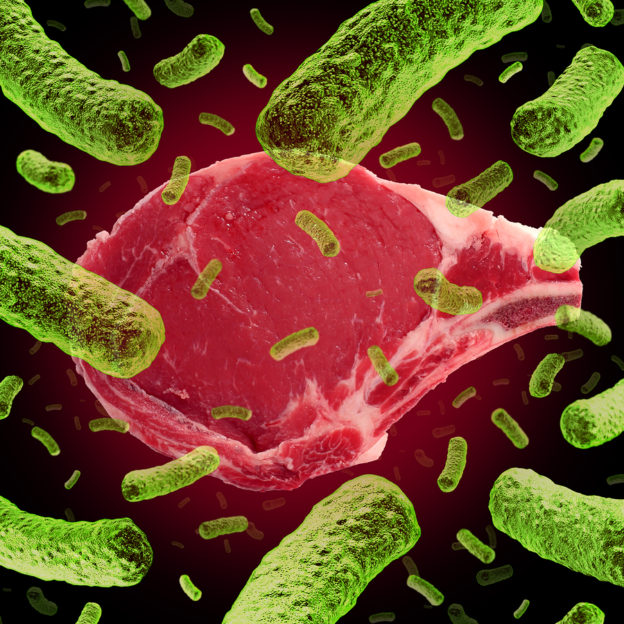By David Blyweiss, M.D., Advanced Natural Wellness
June 19, 2019
Every now and then I get a patient with a case of food poisoning. The symptoms are readily noticeable. Abdominal cramps, nausea, vomiting, diarrhea and fever are the most common.
But in recent months, it seems there has been a noticeable uptick in patients experiencing these symptoms.
It almost feels as though I’m back in the early to mid 2000’s, when cruise ships were plagued with the norovirus. Some of the passengers were patients of mine, who returned from Ft. Lauderdale and Miami based cruises with agonizing symptoms.
While the source of this common type of cruise ship outbreak is very easy to track, it’s not always possible to identify the culprit behind unbearable gastrointestinal distress when you’re at home.
My patients can only speculate.
Open your arteries, improve blood flow for a new health miracle...
Did you know your circulatory system has over 60,000 miles of arteries, veins and other blood vessels, if stretched end to end?
But as you age, your blood vessels undergo changes, which may cause them to stiffen, thicken and get clogged.
GOOD NEWS! Doctors have now identified a “Miracle Molecule” inside your arteries that helps OPEN your arteries and IMPROVE blood flow.
It’s what Dr. Valentin Fuster calls it, "One of the most important discoveries in the history of cardiovascular medicine."To you, that means...
- Healthy blood pressure
- Sharper mind and memory
- Skyrocketing energy and muscular strength
- Increased pleasure and passion in the bedroom
- Improved circulation to every cell and organ in your body
Go here to discover a new natural way to significantly boost the levels of this miracle molecule in YOUR body NOW!
“Maybe I undercooked the pork last night”… “Perhaps my steak was tainted”… “It could have been those chicken breasts I threw on the grill.”
Who knows?
What I can tell you is this:
Every piece of meat you buy at the grocery store is suspect. Like it or not, the amount of harmful bacteria in grocery store meat is raging out of control.
In fact, it is so bad that the Physician’s Committee for Responsible Medicine (PCRM) recently filed a lawsuit against the U.S. Department of Agriculture. This group of health experts claims the USDA is ignoring routine fecal contamination of chicken and other meats.
Even in your wildest dreams you could never imagine how severe the problem is.
The World's Quickest Solution for Ending Prostate and Urinary Misery
This has recently been revealed to be one of the only real breakthroughs in prostate health.
The seeds of a strange fruit (sometimes called "Chinese Apples") hold powerful phytonutrients that are a revolution in prostate health.
In fact, UCLA and Veterans Administration research have now proved this to be true.
Not only that, but it may be the worlds quickest solution for ending prostate misery.
Simply stated, these phytonutrients represent a huge step beyond beta sitosterol, saw palmetto, and other phytosterols alone.
Simply click HERE if you want to have fast prostate relief...restful, uninterrupted sleep...no more constant "urges to go"...enhanced virility...and optimal prostate support for life.
You see, the USDA has a “zero tolerance” policy for fecal contamination in meats and poultry.
As far as I’m concerned, zero equals zero. None. Nil. Non existent. (I learned that back in grade school, just like you did!)
But I guess the folks at the USDA skipped that class. Because according to them, zero only applies to VISIBLE fecal contamination.
Well guess what happens when chicken hits the processing plant? According to a federal inspector who is quoted in the PCRM lawsuit:
“We often see birds going down the line with intestines still attached, which are full of fecal contamination. If there is no fecal contamination on the bird’s skin, however, we can do nothing to stop that bird from going down that line. It is more than reasonable to assume that once the bird gets into the chill tank (a large vat of cold water), that contamination will enter the water and contaminate all of the other carcasses in the chiller. That’s why it is sometimes called ‘fecal soup.’”
And what about feedlot beef?
Well, the steers that produce commercial beef products are forced to stand around and sleep in their own manure their entire lives. Worse, they are caked head to toe with it when they are sent to the slaughterhouse.
So all the manure needs to be removed so it doesn’t end up in the meat. But the system isn’t perfect, which is why so many beef products get recalled for e.coli contamination. (For example, just before Memorial Day weekend, a whopping 31 tons of raw beef products were recalled.)
4 Ways to Avoid Food Poisoning from Meat
Now I know you think I’m trying to scare you out of eating meat. But I’m not.
I simply want to make you aware of the pitfalls associated with fecal contamination that regularly occurs in meat products… and share some tips on how to bypass them so that you don’t end up with food poisoning.
- While the message has been very clear to keep raw meats away from produce and ready-to-eat foods, I still see people jamming their herbs, veggies and other foods in the same grocery bag as their steak and chicken. Always bag meat separately, and provide a designed spot away from other foods in the fridge.
- Keep things clean while you’re cooking. Don’t pick up the knife and cutting board you just used to cut up a chicken to chop onions or tomatoes. Switch them out or scrub them with hot soapy water before re-using. And don’t forget to wash your hands between tasks.
- Always use a meat thermometer. Just because meat “looks” done it doesn’t mean the internal temperature is high enough to kill bacteria. Safe minimum cooking temperatures are 165° for poultry, 160° for ground meats, and 145° (followed by a 3 minute rest period) for beef, pork, veal and lamb.
- Additionally, buying grass-fed/pasture-raised may reduce the risk of ingesting meats infected with risky bacteria.
In the event you ever do find yourself with a case of food poisoning, avoid solid foods until your stomach settles down. Instead, drink plenty of healthy liquids (these don’t include soda, fizzy water or coffee.)
Then, when you’re ready to start eating again, choose small portions of light, wholesome foods.
If symptoms persist, if they are severe, or if you experience symptoms of dehydration (confusion, rapid heart beat, dizziness), make sure to visit your physician or local urgent care provider.
SOURCES:
Doctors Sue USDA for Ignoring Concerns Over Fecal Contamination of Chicken. News Release. Physician’s Committee for Responsible Medicine. April 2019.
Safe Minimum Internal Temperature Chart. United States Department of Agriculture. Last Updated May 2019.







